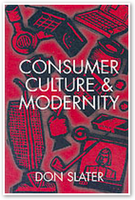 In Part One of this series, based on a lecture I delivered at the University of Calcutta in March 2006, I define “consumer culture” and begin to discuss some of the implications, good and bad, for individuals living in a consumer society.
In Part One of this series, based on a lecture I delivered at the University of Calcutta in March 2006, I define “consumer culture” and begin to discuss some of the implications, good and bad, for individuals living in a consumer society.Note: I'm grateful to Joe Rumbo, with whom I originally developed and wrote about some of the ideas in this series.
When the University of Calcutta’s Department of Business asked me to offer a lecture on “anti-consumer” attitudes, I was grateful for the opportunity to revisit research I had done several years earlier on this burgeoning phenomenon among a small but significant number of Americans. At the time of my lecture, I had been in India for four months working on research about struggles against multinational corporations that pollute local environments and harm people’s health. Much of this pollution is the direct result of the manufacturing of goods for Western consumers, and increasingly for the growing number of new middle-class Indian consumers.
The basic logic goes like this: Capitalism requires a constantly expanding economy. Economic expansion takes place, among other ways, through the mass production of more goods in more efficient ways (efficiency is achieved by reducing the cost of inputs like raw materials and labor). These efficiently produced goods then need to be consumed. With saturated consumer markets in U.S. and most of the developed world, countries like India represent the next great hope for capitalists looking for new consumers.
There are two forms of pollution in this process. The first is the obvious environmental pollution that results from manufacturing processes (e.g., the chemicals that are emitted into air and water in the process of manufacturing plastic and electronics for the production of mobile phones). In this essay, I want to focus on the other type of pollution that results. I call this second type of pollution the pollution of culture and mind. It results as the proliferation of consumer goods, and the cultural meanings ascribed to these goods--meanings that are mostly created by the agencies marketing the goods but also to a lesser extent by the people consuming the goods--transforms a culture. As the culture becomes transformed, marketing messages and the system of meanings attached to material goods begin to occupy more and more of our mental space.
Environmental pollution is a profound problem, but can be addressed by a combination of technical solutions and social restructuring. Pollution of culture and mind is more difficult to address because we don’t see it as a problem the way we see people suffering from exposures to industrial hazards as a problem. Even if we did see it as a problem, there are no technical fixes and we lack a vocabulary or discourse for thinking about solutions.
So, the question I want to explore is whether, in the process of pursuing developed-world levels of economic growth, India is “selling its soul” as the legendary Faust is purported to have done (and as some might argue the U.S., the unparalleled consumer society in the world, has already done)? I’ll begin by defining what I mean by a consumer culture, and in the next installment I will discuss some of the downsides of the American consumer society in order to highlight some of the changes western-style consumerism is likely to bring to India.
Consumer Culture Defined
As a sociologist, I should begin with a distinction between society and culture. A society can be defined as a group of individuals bound together by a set of social arrangements, sometimes called social structures, intended to facilitate the accomplishment of certain essential tasks to sustain itself. These tasks include, but are not limited to, reproduction of members, production and distribution of food, clothing, and shelter, maintenance of health, education of its members, and the passing on of the patterns and practices that govern the society.
Culture, which can be viewed as a set of tools people use to function in society, has a certain amount of overlap with the above definition of society. I will define culture as the tangible and intangible, or material and symbolic, resources available to the members of a society to carry out the tasks needed for sustaining itself. Thus we arrive at a more formal definition of consumer culture, which I borrow from a book titled Consumer Culture & Modernity:

“[Consumer culture is]… a social arrangement in which the relation between lived culture and social resources, between meaningful ways of life and the symbolic and material resources on which they depend, is mediated through markets” (Slater, 1997, p. 8)
In other words, in a consumer culture, the role of the consumer is to find and purchase in the marketplace whatever material or symbolic resources she or he needs to function in society. Status, prestige, esteem, love, and even salvation—in a consumer culture, all of these intangibles are available in the marketplace. This is not to say that one can no longer gain the admiration of others through good works alone. But as more and more individuals purchase the goods that earn them the admiration of others, genuinely earned admiration is cheapened. Cultural meanings and values become encoded in material goods, and eventually it becomes easier to communicate information about oneself through possessions than through deeds.
In a consumer culture, everything we need to function in everyday life—from food and shelter to gossip and fun—is obtained primarily through markets. Culture continues to be produced and reproduced through forms of consumption that take place outside of markets, but consuming in the marketplace becomes the default strategy for making everyday life meaningful.
For now, I don’t want to place any value judgments on consumer cultures. There are many useful aspects of consumer cultures, some of which I will talk about in future installments in this series. I begin with this definition so that we can start to think about what it means for a society when it makes a transition from one type of culture--for example one derived largely from religious beliefs and traditions--to another type of culture such as a consumer culture.
All significant cultural shifts unsettle the members of a society in some way. Is there something about the shift to a consumer culture that results in a greater amount of anxiety or even social disorder than the shift, for example, from earlier cultural traditions to the Age of Enlightenment? I know I am using the idea of culture rather loosely in suggesting that the Age of Enlightenment represents a unitary culture, but just consider the question
 for the sake of discussion. If there are past cultural shifts that have similarities to the shifts many contemporary cultures are making to a consumer culture, then we ought to understand these past shifts in order to better prepare for today’s ongoing transformations to consumer cultures. And if there are not similarities, then we need better critical thinking about what is happening around the world today.
for the sake of discussion. If there are past cultural shifts that have similarities to the shifts many contemporary cultures are making to a consumer culture, then we ought to understand these past shifts in order to better prepare for today’s ongoing transformations to consumer cultures. And if there are not similarities, then we need better critical thinking about what is happening around the world today.Consumer cultures will be the dominant global cultural form by the end of this century. In the remainder of this series, I hope to make a modest contribution to understanding what this transformation means with respect to India. My hope is that my ideas start some dialogue that might help today’s cultural leaders make the transitions to consumer cultures smoother for their societies.
Technorati tags: consumerism


1 comment:
hi. this is very interesting blog entry i have found. My premise for an art project i ve been working on.
Its also about how indian identities are changing and fragmenting at the same time.
It works from the perspective of an nri who becomes a symbol/representation of a highly urbanised indian, but at the same who has a recollection of an earlier india, to bring out the contrast. He becomes aware of the consumerist fallacy in Dubai where he is working, and decides to come back home, but realises he cant find himself back home either, and gets confused seeing the changes its going through, i have also been referring to Dipanker Gupta, and Pankaj Mishra's Butter Chicken during the course of the project, the initial premise of the project aligns with the concerns you have written about here.. this is a link to the blog http://chanjelings.wordpress.com/
and the final product is taking shape in the form of a non linear interactive narrative. thanks for putting this up, really articulates my initial frame work well.. hoping to discuss it further
Post a Comment